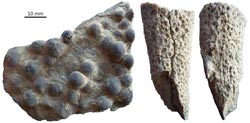Reefs recovered faster after mass extinction than first thought

reef-forming sponges, Early Triassic era<br>
Harsh living conditions caused by major fluctuations in the carbon content and sea levels, overacidification and oxygen deficiency in the seas triggered the largest mass extinction of all time at the end of the Permian era 252 million years ago. Life on Earth was also anything but easy after the obliteration of over 90 percent of all species: Throughout the entire Early Triassic era, metazoan-dominated reefs were replaced by microbial deposits.
Researchers had always assumed it took the Earth as long as five million years to recover from this species collapse. Now, however, an international team, including the paleontologist Hugo Bucher from the University of Zurich and his team of researchers, has proven that reefs already existed again in the southwest of what is now the USA 1.5 million years after the mass extinction. These were dominated by metazoan organisms such as sponges, serpulids and other living creatures, the researchers report in Nature Geoscience.
Growth thanks to new reef-forming metazoan organisms
Metazoan-dominated reefs already developed during the Early Triassic, much earlier than was previously assumed. As soon as the environmental conditions more or less returned to normal, the reef began to grow again due to metazoan organisms that had played a secondary role in reefs up to then. “This shows that, after the extinction of dominant reef creators, metazoan were able to form reef ecosystems much sooner than was previously thought,” says Hugo Bucher, summing up the new discovery.
Literature:
Arnaud Brayard, Emmanuelle Vennin, Nicolas Olivier, Kevin G. Bylund, Jim Jenks, Daniel A. Stephen, Hugo Bucher, Richard Hofmann, Nicolas Goudemand and Gilles Escarguel: Transient metazoan reefs in the aftermath of the end-Permian mass extinction, in: Nature Geoscience, 18 September 2011, DOI: 10.1038/NGEO1264
Contact:
Prof. Hugo Bucher
Institute of Paleontology and Museum
University of Zurich
Phone: +41 44 634 23 44
E-mail: hugo.fr.bucher@pim.uzh.ch
Media Contact
More Information:
http://www.uzh.chAll latest news from the category: Ecology, The Environment and Conservation
This complex theme deals primarily with interactions between organisms and the environmental factors that impact them, but to a greater extent between individual inanimate environmental factors.
innovations-report offers informative reports and articles on topics such as climate protection, landscape conservation, ecological systems, wildlife and nature parks and ecosystem efficiency and balance.
Newest articles

Properties of new materials for microchips
… can now be measured well. Reseachers of Delft University of Technology demonstrated measuring performance properties of ultrathin silicon membranes. Making ever smaller and more powerful chips requires new ultrathin…

Floating solar’s potential
… to support sustainable development by addressing climate, water, and energy goals holistically. A new study published this week in Nature Energy raises the potential for floating solar photovoltaics (FPV)…

Skyrmions move at record speeds
… a step towards the computing of the future. An international research team led by scientists from the CNRS1 has discovered that the magnetic nanobubbles2 known as skyrmions can be…





















